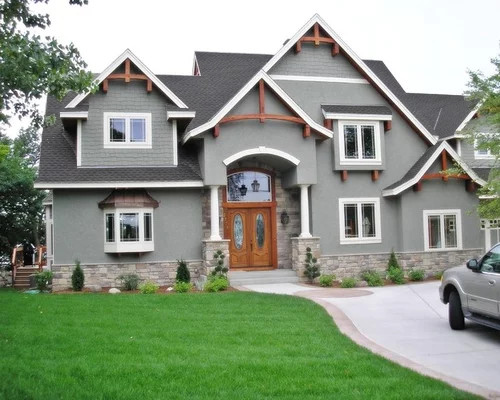
To protect exterior walls of homes from the elements, manufactured home siding is used. These materials include wood, vinyl, and fiber cement. These options can add style and strength to your home. It is important to select the right type of siding for your home.
Cedar is one of oldest siding options. It's known for its resistance to moisture and decay. You can also get it in different sizes and shapes. However, cedar plank siding is a more labor-intensive option. The wood cannot be secured with common screws or galvanized nail. Regular maintenance is necessary to keep the wood looking its best. It can be stained or factory-finished for a rustic look.
Another option for manufactured houses is the board-and-batten style. A thin batten fills in the gaps between wide boards. You can install it horizontally or vertically. These options can be stained and painted to your liking. You may also consider faux stone siding for a unique mobile home finish. This material is also fire and insect resistant.

Vinyl siding is the most widely used siding option. It is easy to install and has the traditional look of wood. It is made to last, unlike other siding types. It comes in a variety of colors and patterns to suit your taste. To prevent oxidation of your painted surfaces, apply a protective coating.
Fiber cement can be used to replace vinyl and wood. It's made using a special blend of cement and sandy sand. This gives it the ability to mimic other materials while also resisting moisture. It is also strong and resistant to rot. It can be used as an accent on the exterior of a manufactured house and can be made in any color. It is typically available with a 25-year or 50 year warranty.
Choosing a material for your manufactured home is a crucial step in making sure your home is durable and comfortable. The material can have a huge impact on how efficient your home is in terms of energy consumption. It can keep your heating/cooling units running more efficiently, which in turn means you spend less on utilities. It is also resistant towards water damage.
Although metal siding is often seen as an environmentally-friendly choice, it can be expensive. Although metal siding is fireproof it can warp, rust and crack if it's not well maintained. It is also not recommended in areas of high humidity because it shows dirt more than other materials. While it can be painted with some effort, it's not always the best choice for mobile homes.

Plywood and OSB are commonly used for mobile home siding. Plywood is a thicker material, but it's smoother and more easy to seal. OSB is, however, a more hardy material that can be harder to sand. It is also more costly than wood that has been dried in the oven or air. Aluminum nails are not recommended for siding as they will not resist rust stains.
FAQ
Can I remodel my whole house by myself?
If you are able to do it yourself, why not pay someone else?
It doesn't really matter how much you love DIY. There will always be times when you just can't do it. You may not be able to control all the variables.
You might discover that the wiring in your home is not up to date. In this case, you'll need to hire an electrician to ensure that your electrical system works safely and reliably.
Also, you should consider that some structural damage may not be possible during renovations.
Additionally, you may not have the right tools to complete the job. For example, if your goal is to install a new sink in your kitchen, you will need to purchase a plumber’s snake, which is designed to clear blocked pipes.
There are plumbing codes that will require you to hire a licensed plumber for your project.
You need to be able to do the job before you take on any large tasks.
If you aren't sure if you have the skills or knowledge to tackle the task, get help from your family and friends.
They can offer advice about what to do and where to go for more information.
Are you better off doing floors or walls?
The best way of starting any project is to determine what you want. It is essential to consider how the space will be used, who will use it, and why. This will help you decide if you should go for flooring or wall coverings.
You can choose to put flooring in the first place if you decide to open up your kitchen/living space. You can also choose wall coverings if you want to make the room private.
How many times should I change my furnace's filter?
How often your family expects to use the heating system in their home will determine the answer. It is worth changing your filter more often if you intend to spend a lot of time outside during winter months. If you are not likely to leave your house for long periods of time during cold weather months, you might be able make more frequent changes.
A furnace filter typically lasts for three months. You should replace your furnace filters every three months.
The manufacturer will also give you recommendations on when to change your filter. Manufacturers recommend changing your filter after each heating season. Other manufacturers suggest waiting until visible dirt builds up.
Statistics
- On jumbo loans of more than $636,150, you'll be able to borrow up to 80% of the home's completed value. (kiplinger.com)
- They'll usually lend up to 90% of your home's "as-completed" value, but no more than $424,100 in most locales or $636,150 in high-cost areas. (kiplinger.com)
- Rather, allot 10% to 15% for a contingency fund to pay for unexpected construction issues. (kiplinger.com)
- It is advisable, however, to have a contingency of 10–20 per cent to allow for the unexpected expenses that can arise when renovating older homes. (realhomes.com)
- Design-builders may ask for a down payment of up to 25% or 33% of the job cost, says the NARI. (kiplinger.com)
External Links
How To
5 Things You Should Know Before Starting Your House Renovation
-
Are you sure that this is something you want to do? If you are planning to do major home improvements like renovating your bathroom or building new houses, you will likely need help. You might reconsider if you're not confident enough to handle such a huge task on your own. It could take up a lot of your time and money, and you won't get any real benefits from it. Instead, you can hire someone who knows their stuff to help. They'll save you a lot of hassle and stress, and you'll still end up with a beautiful space to live in.
-
What amount should I spend on a renovation project? This is a common question, but it can make renovations more expensive. It's because you'll most likely be responsible for paying back the majority of the costs. Keep your budget in mind. Otherwise, you could end up paying a fortune without getting anything in return.
-
Should I use DIY or hire professionals? - While there is no right or wrong answer, we recommend that you hire professional tradespeople if possible. Their advice will be invaluable in helping you decide how to proceed. They will be able to install the plumbing properly, make sure everything is safe, and give you a warranty after they are done. DIY projects can be frustrating because they require a lot more trial and error. This means that you will have to learn many lessons from the experience. There will be many problems along the way.
-
Are you able to afford it? Do not underestimate the costs of a renovation. Even if your budget is tight, you may need to borrow money to cover costs. If you are planning on selling your existing property soon after finishing the renovations, it is important to include the cost of selling it in your calculations.
-
Which place should I start? There is no right or wrong place to begin when it comes to starting. But, we recommend you pick something you love to work on. If you enjoy what you do, you will be more motivated to continue working and less likely procrastinate. Also, try to avoid places that require a lot of maintenance. If you have to deal with dirt and dust, don't try to redecorate the living room.